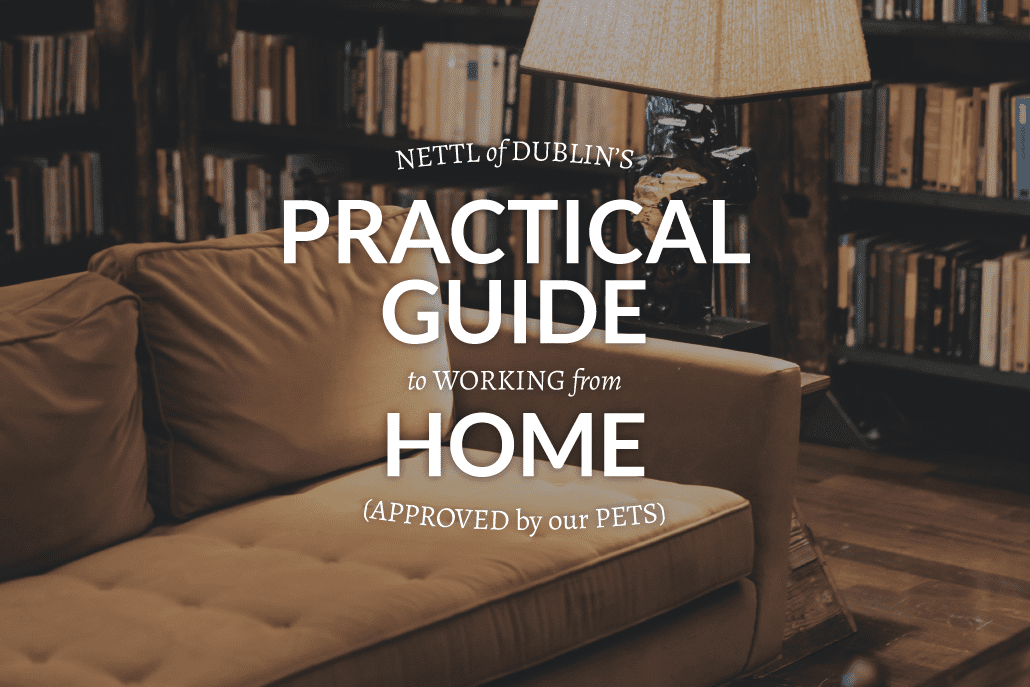As many of us are doing all we can to stop the spread of the dreaded C word. We at Nettl of Dublin understand that the majority of us have to adapt our professional and personal lives to be socially responsible during this time. We’ve put together a few tips for those of us who are fortunate enough to be working from home for a while.
Although there has been an unprecedented amount of negativity surrounding the coronavirus, and understandably so! It is important that we don’t get bogged down with the negative impacts of the virus, and we look at the beauty in the negativity. One being that we are currently taking part in the biggest social experiment of the 21st Century. Working from home can sound like a dream as you have no commute, slightly longer in bed and let’s not forget no meal prep…Woo! However, it can be a huge adjustment and it isn’t always as easy and delightful as it may seem if you are not used to it.
It has been found that many people struggle when working from home for a number of reasons. This can include anything from finding a place that is quiet enough to get your work done, to not being distracted by the fridge, to even experiencing loneliness. Studies have uncovered that people who are used to working in an office environment found that combatting loneliness was the second biggest struggle when working from home. It sounds like a generic statement, but it’s important to keep a balance in your life during this time and to be mindful of your mental health. We are all going through a period of change, and a change that isn’t so seamless as it may seem. We want to help you keep your productivity levels high so that yourself and your business does not suffer during this time of uncertainty.
Here’s our 6 best practices to keep you on top of your game:
Get out of bed, lazy.
We know that working from home can be a strange adjustment for many people. Wrapping your head around that your usual place of comfort, relaxation and leisure is now your work place can be difficult to comprehend. A majority of people don’t have the luxury of having a study or an office, so the question is where do you set up your remote office? A word to the wise, don’t, I mean DON’T work from the comfort of your bed. Although you may be comfortable and cosy, it is one of the worst habits that you could get into when you are working from home. It’s important to recognise that when you are working from home you need to mentally separate your work and home life. Which I know sounds a bit ridiculous because you are now working from home, but our brains are so intelligent that if you are working from the comfort of your room and you attempt to go to sleep, your brain won’t shut off, as your brain has now associated your room with work. Sleep is one of the most important elements when increasing and maintaining your productivity in any situation, so set up office somewhere that you won’t be disturbed, there is a desk and comfortable chair, but most importantly, somewhere that you don’t associate with relaxation.
Don’t be a slob.
One of the luxuries from working from home is the ‘ahhh yes! I don’t have to wear formal wear today.” Of course, it is lovely not having to wear a suit, but it is important that you don’t wear your PJs while you work. Why you may ask? A lot of the struggles of working from home has to do with combatting the psychological impacts that it can induce. If you are wearing your pyjamas or your lounge wear while you’re working, your brain is mentally associating your clothes with relaxation and comfort. It disrupts the working flow whether you realise it or not. It is important that if you are used to wearing formal wear for work, to get up, have a shower and have your breakfast, as normal just like if you were going to work. We aren’t saying wear your three-piece suit at your kitchen table, but even if it is just jeans and a T-shirt, your productivity will increase and be maintained because your brain recognises that you are up and ready to tackle the day.
Fail to plan, prepare to get distracted.
We aren’t all the same, so understanding when you are most productive and structure your work day around that is essential. Structure and plan your day out. Break it into segments and each task into time blocks, that way you are achieving goals and ticking tasks off your list. This may seem simple, but it is a great way to ensure that you are getting work done and achieving something. When you cross tasks off a list your brain releases endorphins and in turn your productivity increases. Similarly, if your day is planned out with clear and achievable tasks, it is easier to avoid becoming distracted by the laundry, and the thousands of other tasks that you have been meaning to get done over the past few weeks. Plan out little two 15-minute breaks that you get up and do something else, even if that is just putting a wash on. These little breaks one in the morning and one in the afternoon, will help you break up your day and increase and focus your work productivity. Similarly, we all know that when we are in the office we have a colleague or a boss sitting next to us who is monitoring our daily work input. However, a lot of people can struggle with this absence of a colleague’s judgement when working from home, as there is no one monitoring what they are doing, meaning that it is more difficult to stay focused. Find ways that you stay accountable for your work and focused, whether that be through finishing a number of tasks before you can take lunch or reward yourself with something once those tasks are complete. It sounds juvenile but putting yourself in competition with your own self can be a really effective way to stay productive at home. Preparing to work from home, is more so about planning for the everyday life distractions that aren’t present in the work place more so than anything else.
Friendly tip; set timers! These timers not only ensure that you stay focused, but they also ensure that you aren’t checking your phone every ten seconds or chatting with other people who may be in the house. Once the timer goes off take a 5 minute ‘tech break’ or ‘chat break’. Studies have shown that the length of time that people can stay at high productive performance for is 45 minutes. So, every 45 minutes set an alarm, take 2 to 5 minutes to stand up, stretch, check your phone, whatever it may be and then sit back down for another 45 and do the same. I know it may sound silly because you don’t do this in work, but you are learning to adapt to a new normal, so you have to give your brain time to adapt also.
Be a chatty Charlie.
Even though you are not around colleagues or customers it is essential that you remain chatty! Communication and human interaction are one of the sole ways to overcome loneliness. Set up Skype or Zoom consultations with your customers, or just call them to check in. Yes, this is a great way to maintain relationships in the long run because you cared enough to call your customer to make sure that they are doing ok, but it is also a great way for you to feel that you are in an office setting. How often would you ring a client from the comfort of your own home? For many of you not that often. Block off an hour a day where you just spend time chatting with people, honestly it won’t only make your customers trust and rely on you more, but it will also keep you sane! The same goes for talking to your colleagues. Organise a time that suits you all to video chat each day, to touch base, fill each other in on what is going on and it also keeps each other in check. This is important because it will bring some normality to your now not-so-normal days.
Switch off in order to switch back on.
For those of you who are not used to working from home, it can sometimes feel that you are not able to switch off and it is often a lot easier to keep on working. Especially, if you did not get your work for the day done. This is not ok. It is important, just like when you are in work, that you have a work-life balance. This balance is just like sleep. It is vital for ensuring great productivity. What we have found incredibly helpful is to ‘book end your day.’ Sounds a bit silly but wake up and consider the start of your day as a book end, something that begins a long list of “books,” and then once half five comes along your working day is over so book end it. For example, this morning before I started my working day, I got up and I popped in my headphones and went and made banana bread. Baking and cooking is my vice. I knew today would be difficult as it was the first day I was working from home in my new role, so I started the day with something that would relax me, keep me calm and release any anxiety that I had. It also I meant that I had a freshly baked good for my lunch (which is always a bonus)! When I finish up work this evening at half 5, I’m going to stick on my runners on and go for a run to book end my day. Having a plan like this not only helps you to structure your day, but it also keeps a work life balance within your home. It’s essential that you learn to switch off and turn off because otherwise you will hate getting up in the morning because you are basically living in your office. Take your hour lunch, plan your day, maintain your sanity and increase your productivity.
Journal like a 13-year-old.
A bit of final advice, if this is your first time working from home at the end of your day jot down things that worked and things that didn’t. Do this for the first few days of working from home and you will begin to notice the times that you were least productive and the things that distracted you. Once you realise and acknowledge these patterns it is easier to overcome the issues that are slowing you down and getting in your way.
We know that these practices are so much easier said than done, but practice makes perfect and over the next few days we will all be experts in working from home.
Until then though, best of luck from all of us. Let’s take this opportunity to learn and grow!



